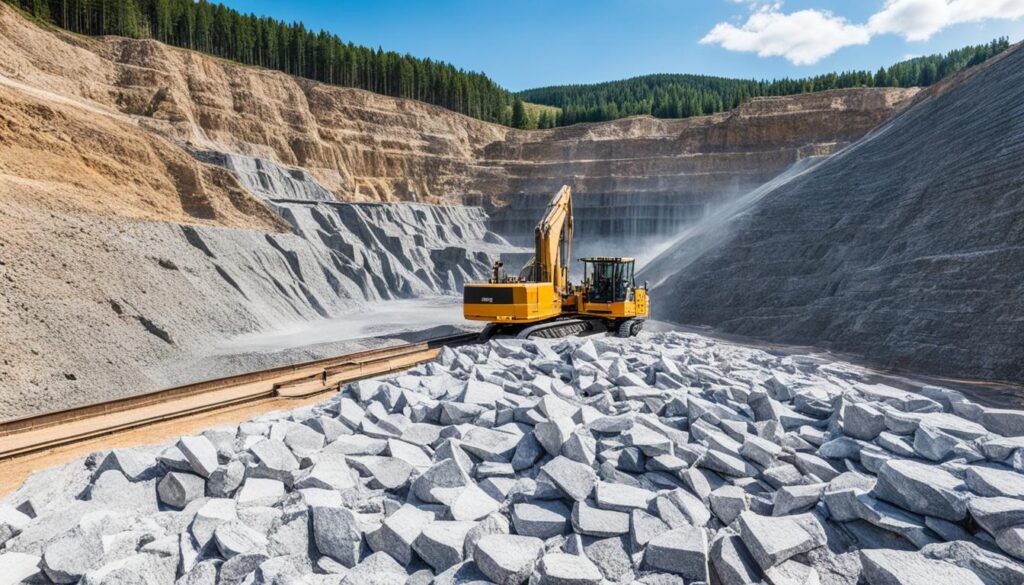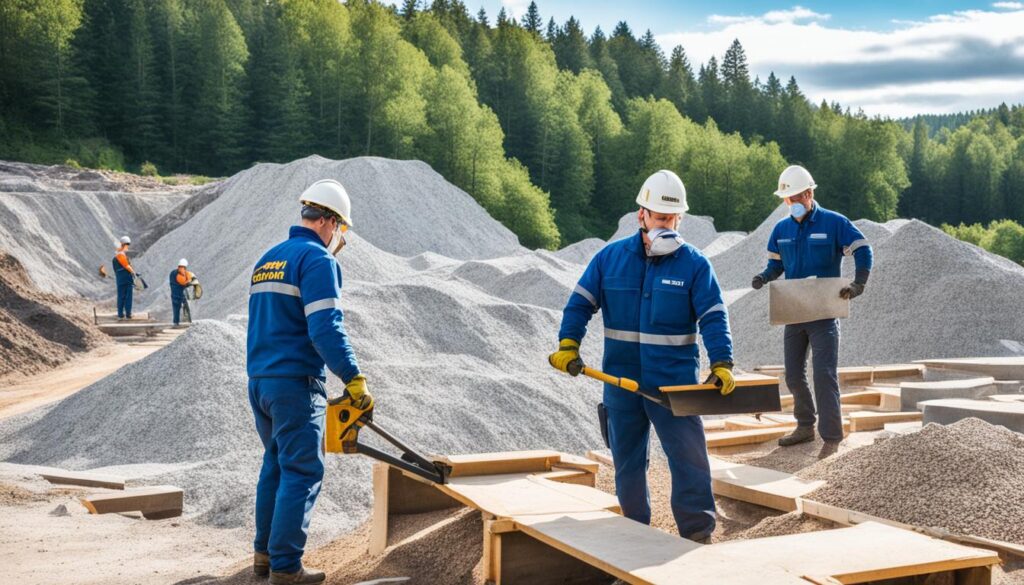Ethical Stone Suppliers: Importance in Trade
Lately, more people want stones that come from ethical sources. They care about the environment, fair work, and clear trading of precious gems. Ethical suppliers are very important. They make sure stones come from places that respect people and nature. Most of the stones in the UK are from Asia, mainly India1. It shows how much we need good ethical practices.
Buyers look for stones that are responsibly found. They think about how their choices affect communities and the environment. Companies like Beltrami and London Stone focus on getting stones the right way1. They follow strong ethical standards, proven by awards from groups like the Responsible Jewellery Council (RJC) and the Kimberley Process Certification Scheme (KPCS).
Key Takeaways
- The surge in demand for ethical stones is driven by consumers who value transparency and sustainability.
- Approximately 68% of the stone imported into the UK comes from Asia, primarily from India1.
- Ethical stone sourcing enhances community development and social responsibility.
- Certifications like the Responsible Jewellery Council (RJC) and the Kimberley Process Certification Scheme (KPCS) validate ethical sourcing.
- Companies such as London Stone and Marshalls are actively involved in ethical sourcing initiatives1.
Introduction to Ethical Stone Sourcing
The path gemstones take from mine to market has faced issues like environmental damage and human rights violations. Yet, groups such as the Responsible Jewellery Council and Fair Trade Gems are making great strides in ethical stone sourcing. They make sure the gem trade is transparent, fair, and kind to the environment, making a big difference in the communities involved.
The gem industry is big, estimated at US$10–$15 billion worldwide2. It spans 47 countries and is mostly made up of small mining operations2. These small-scale mines pull out most of the stones, showing a large portion of the world’s gems2. With roughly 30 million people mining, including 2 million kids, it’s crucial to have ethical rules to protect them and support sustainable growth.
Today’s shoppers, especially younger ones, want to know where their jewelry comes from2. By choosing ethically sourced gems, they push for a better world. Brands like Gemfields lead the way by selling ethically sourced gems and showing why responsible mining matters2.
There’s also a business side to being ethical. Companies see benefits like increased loyalty from socially aware buyers3. Investing in ethical practices can pay off, bringing in more customers who care about the planet and its people. This way, ethical companies grow sustainably and build a strong, positive brand image.
Traceability and Transparency in the Stone Industry
Traceability and transparency are vital in the stone industry. They ensure consumers get ethically sourced products. These practices help maintain trust and support positive impacts4.
When sourcing sustainably, we see benefits for social and environmental health. This strengthens confidence in stone products5.
Importance of Traceability
Traceability tells us where gemstones come from. It ensures they’re conflict-free and ethically sourced. Using fair labor and responsible sources is key4.
Solstice works hard to have ethical supply chains, noted by Green Matters. The Kimberley Process Scheme aids in keeping conflict diamonds out of the market. These actions underscore the significance of traceability6.
Methods of Ensuring Transparency
Several methods foster transparency in the stone industry. Keeping documented supply chains and getting certifications help. This includes endorsements from the RJC and the KPCS5.
Blockchain is also a budding tool for better transparency. Programs by De Beers and IBM aim to trace diamonds from the start to end6. Solstice ensures their crystals can be traced back, supporting good practices and community benefits. Focusing on sustainable supply chains is crucial for environmental care and ethical sourcing4.

Responsible Mining Practices
Responsible mining is key in the gemstone industry today. It helps lessen ecological damage and supports environmental care. Ethical suppliers work with mines that follow strict environmental rules. These measures include proper waste handling, land restoration, and saving water. The use of sustainable gems, like recycled diamonds and fair trade stones, reduces harm to the environment. These practices consider the gem’s origin and protect the land and water78.
Helping artisanal miners is also vital. Focusing on ethical sourcing helps these small miners get fair treatment, safe conditions, and just pay. This bans child and forced labor8. Such actions also boost sustainable growth in local areas78. Groups like the Responsible Jewellery Council (RJC) make sure mining and selling follow ethical rules. They stress the need for eco-friendly ways and fair treatment8.
Mining faces issues like deforestation, pollution, and forced labor. This makes responsible mining even more important9. Suppliers focusing on ethics, like With Clarity, choose mines that care for the environment and communities. They follow rules like the Kimberley Process and UN Resolutions9. The industry is also turning to renewable energy, less waste, and blockchain for more transparency9.
The push for ethical gem sourcing is growing. New tech and teamwork in the industry promote responsible mining9. This dedication ensures the protection of workers and the environment. It’s the basis of a sustainable and ethical trading system.
Supporting Ethical Stone Suppliers: Why It Matters
Supporting ethical stone suppliers worldwide is key to sustainable gemstone practices. Ethically sourced gemstones ensure responsible mining and fair work conditions. Little Sky Stone focuses on partnering with suppliers who meet ethical guidelines, showing a commitment to both social and environmental responsibility10.

Positive Environmental Impact
Buying from ethical sources positively affects the environment. It helps keep rivers clean, reduces land conflicts, and prevents soil becoming infertile. Little Sky Stone emphasizes transparency and traceability, so every gemstone purchase supports fair work and eco-friendly measures. Learn more about how supporting ethical suppliers is crucial for environmental health and sustainability10.
Benefits for Local Communities
Choosing ethically sourced stones helps local communities thrive. Investing in ethical supplies fosters community growth with better education and health services. It creates a safe mining environment without child or forced labor10.
Little Sky Stone’s approach to sourcing ethically makes a real difference in improving lives. Offering products like Birthstone Silver Charms, Amethyst Necklaces, and Pavé Sapphire Huggies reflects this ethics. It leads to benefits for both customers and local makers10.
Fair Trade Initiatives in the Stone Industry
Fair Trade is key in the stone industry for fair deals and good working conditions. It means products follow FLOCERT rules for treating workers right and ethical sourcing11. These efforts help improve lives and bring stability to places affected by mining.
Adopting these ethical practices moves the industry towards being more sustainable and accountable.
Fair Trade initiatives help stabilize economies by offering fair pay. This helps miners and artisans provide for their families and support their communities11.
They get more than just a fair wage. They also get chances for education and health care, making their communities stronger11. This follows the principles of the World Fair Trade Organization, promoting honest and ethical business.
Some think fair trade causes issues like too much supply and high prices for buyers11. Yet, many brands and shoppers still back these actions. They see the benefits for a more just and sustainable gemstone market.
Fair trade investing puts money into ethical companies or projects. This approach and the rise in demand for ethical gemstones show a shift towards sustainability in the industry11.
FAQ
What is the importance of ethical stone suppliers in the trade?
What does ethical stone sourcing entail?
How is traceability implemented in the stone industry?
What are some methods of ensuring transparency in stone sourcing?
What practices are considered responsible mining?
What are the positive environmental impacts of supporting ethical stone suppliers?
How do ethical stone suppliers benefit local communities?
What are Fair Trade initiatives in the stone industry?
Source Links
- The Color of Responsibility: Ethical Issues and Solutions in Colored Gemstones | Gems & Gemology
- Why Ethical Sourcing Matters – FasterCapital
- How Does Ethical Gemstone Mining Work?
- SOLSTICE | Ethical Sourcing
- Traceability and Blockchain for Gemstones – an Overview – SSEF
- The Importance Of Sourcing Sustainable Gemstones
- What are Ethical Gemstones?
- How Jewelers are Promoting Responsible and Sustainable Mining | With Clarity
- Ethically Sourced Gemstones: Why They Matter
- Fair Trade Price: What it Means, How it Works, Tenets



